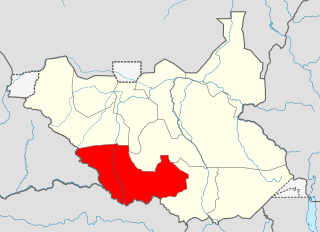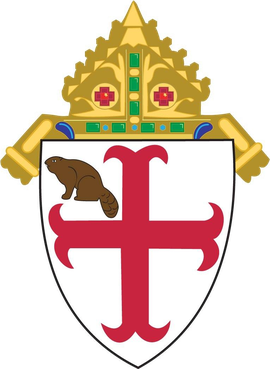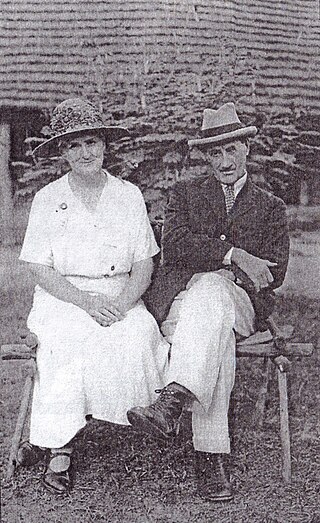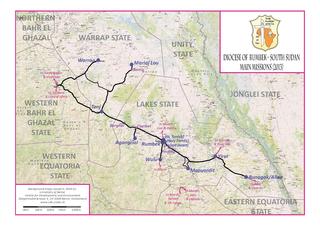
Western Equatoria is a state in South Sudan. It has an area of 79,343 square kilometres (30,635 sq mi). The state capital is Yambio. The state was divided into counties, each headed by a County Commissioner. Western Equatoria seceded from Sudan as part of the Republic of South Sudan on 9 July 1956. On October 2, 2011, the state was divided into Amadi, Maridi, and Gbudwe states, and Tambura State was split from Gbudwe state on January 14, 2015. Western Equatoria was re-established by a peace agreement signed on 22 February 2020.

The Avukaya are an ethnic group of South Sudan. Some members of this ethnic have fled to the Democratic Republic of the Congo due to persecution. About 50,000 members of this ethnic group live in South Sudan. Many members of this ethnic group belong to the Christian minority of South Sudan. The Avukaya traditionally live in a rain-forest area in Equatoria close to the Democratic Republic of Congo in Southern Sudan.
Moru is an ethnic group of South Sudan. Most of them live in Western Equatoria. They speak Moru, a Central South Sudanic language. Many members of this ethnicity are Christians, most being members of the Episcopal Church of the South Sudan (ECS). The Pioneer missionary in the area was Dr Kenneth Grant Fraser of the Church Missionary Society (CMS). The population of this ethnicity possibly does not exceed 200,000.

Kajo Keji, also spelled Kajokaji, Kajukeji, Kajo-keji and Kago Kaju, is a town in South Sudan.
The Province of the Episcopal Church of South Sudan, formerly known as the Episcopal Church of Sudan, is a province of the Anglican Communion located in South Sudan. The province consists of eight Internal Provinces and 61 dioceses. The current archbishop and primate is Justin Badi Arama. It received the current naming after the inception of the Province of the Episcopal Church of Sudan, on 30 July 2017.

The Episcopal Diocese of Iowa is the diocese of the Episcopal Church in the United States of America which covers all of Iowa. It is in Province VI. Its offices are in Des Moines, and it has two cathedrals: the Cathedral Church of St. Paul in Des Moines and Trinity Cathedral in Davenport.

Christianity has a long history in the region that is now Sudan. Ancient Nubia was reached by Coptic Christianity by the 1st century.

The Episcopal Diocese of Albany is a diocese of the Episcopal Church covering 19 counties in northeastern New York state. It was created in 1868 from a division of the Episcopal Diocese of New York.
Marc R. Nikkel (1950–2000) was an American Episcopal priest, artist, author, teacher, missionary to the Sudan, and advocate for the Dinka ("Jieng") people of South Sudan.

Lainya is a county in Central Equatoria State, South Sudan. Emmanuel Khamis Richard is the current commissioner of Lainya County.

Kenneth Grant Fraser O.B.E., M.D., Edin., D.P.H., F.R.C.S.E. or "Dr Fraser" as he is commonly remembered, was a Scottish missionary doctor and educator in Southern Sudan, specifically working among the Moru people.
Ezra Baya Lawiri was a Sudanese teacher, Episcopalian priest and scholar, responsible for translating The Bible into the Moru language. He is commemorated by a statue in niche 174 on the Great West Front of Salisbury Cathedral.

Christianity is the most widely professed religion in South Sudan, with significant minorities of the adherents of traditional faiths and Islam.

Bangladesh–South Sudan relations refer to the bilateral relations between Bangladesh and South Sudan. The core areas of cooperation have been the services of Bangladeshi peacekeepers in South Sudan, involvement of Bangladeshi NGOs in various sectors of social development of South Sudan and the investment of Bangladeshi firms in South Sudan, particularly in the agricultural sector.

Amadi State was a state in South Sudan that existed between 2 October 2015 and 22 February 2020. Amadi state formed from Western Equatoria state on 2 October 2015, following a decree that established the state along with 27 other states. It was located in the Equatoria region. Amadi State bordered Eastern Lakes State, Jubek State, Maridi State, Terekeka State, Western Lakes State, Yei River State.
Benjamin Wani Yugusuk was a Sudanese Anglican (Episcopalian) bishop. He was the second archbishop and primate of the Episcopal Church of Sudan, from 1988 to 1998.

Pacong is a town in South Sudan. The town is located just outside Rumbek on the road to Wulu.
The Province of the Episcopal Church of Sudan is a province of the Anglican Communion, comprising the Sudan. It is the 39th Anglican province, created in a ceremony that took place in All Saints Cathedral, Khartoum, on 30 July 2017. The first archbishop and primate is Ezekiel Kondo.

Yei River County is an administrative area in Central Equatoria with a large population of people who settled in that particular county.












